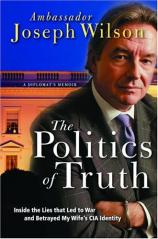The Politics of Truth: Inside the Lies That Led to War and Betrayed My Wife's Cia Identity
Review
The Politics of Truth: Inside the Lies That Led to War and Betrayed My Wife's Cia Identity
Joseph Wilson was a retired Ambassador in January 2002 when the
Bush administration received a report that Niger had sold uranium
to Iraq. Vice President Cheney asked the CIA to determine if there
was any truth to the report, and the CIA in turn asked Wilson to go
to Niger to investigate. He was certainly an expert on both Africa
and the Middle East. During his 22-year career, Wilson had been an
Ambassador in Niger, Togo, South Africa, the Congo, Gabon, Sao Tome
and Principe. As the Ambassador in Iraq during Desert Storm, he met
with Saddam in an attempt to get him to leave Kuwait and protected
American hostages. As a political adviser to the Commander in Chief
in 1995, Wilson was stationed in Germany and worked with other
ambassadors to keep a close eye on the Iraqis' use of their
airspace. Called Operation Northern Watch, it continued to function
up until the second Gulf War.
In 2002, Wilson went to Africa at the request of the CIA. He knew
the officials who would have made the decisions and signed the
documents, had a sale taken place, and after speaking with the
officials and ambassadors over there, Wilson found no signs of a
sale. There was no record of a sale in the Nigerian equivalent of a
Federal Register, and even an off-the-books sale would've been
documented. Also, American aid had helped prevent starvation in
Niger in the '70s and '80s, and the leaders were aware of their
dependence on the West and the U.S.
Although Wilson gave his skeptical report to the CIA, British and
American officials continued to speculate that there was uranium in
Iraq and used it as justification to go to war. Wilson knew this
was bogus, and when he spoke out about it on CNN in March 2003,
Republican officials were already starting to plan ways to
discredit him. In July, he wrote an op-ed article about his
findings in Africa for the New York Times. A few days later,
Washington Post columnist Robert Novak encounters Wilson's
friend on the street and informs him that Wilson's wife, Valerie
Plame, is a CIA agent and reports this information in his column.
What followed was a media flurry of articles and statements from
the government. Though there have been reports that the leak about
Plame's CIA identity came from two employees in Cheney's office, to
date no one has been charged.
Wilson writes about this scandal in clear-eyed prose. He doesn't
attempt to be objective, but he does stick to the facts and he
backs up his information with newspaper articles and a
bibliography. Fortunately, in a season of political tomes, this
500-page book also documents Wilson's long and distinguished career
as a diplomat.
Wilson's parents were journalists who covered cultural topics in
Europe, and Wilson spent much of his youth in Europe. His command
of French was what landed him his first ambassador job in the late
'70s in Niger, a place few people wanted to go. But Wilson quickly
came to love the people and the place, and in future years he
relished working in different parts of Africa. While working as a
special assistant to Clinton in 1998, he planned a historic,
eight-country trip to Africa. Few presidents have visited Africa,
and the two men traveled to dispel American myths about the
continent and to garner support for the African Trade Bill, which
eventually passed.
Wilson married Valerie shortly after he retired. Wilson is
surprisingly candid about his relationship with his first wife, who
is the mother of Wilson's beloved twin sons and daughter, as well
as his current relationship. Valerie continues to work at the CIA,
though obviously it's not the same as it once was.
For all practical purposes, Wilson is a Democrat --- he had a
Congressional Fellow with Senator Al Gore in 1985 and is supporting
Kerry's campaign --- but he is no hard-liner. George H.W. Bush
admired Wilson, especially after Desert Storm, and called him
"truly inspiring." Initially, Wilson was not disdainful of the
younger Bush, but that changed after he smeared McCain during the
presidential campaign. Wilson also agreed with the way Reagan
undermined Communist rule in Poland during his presidency. And even
though Wilson feels betrayed by his government, he still believes
wholeheartedly in America and democracy.
Reviewed by Jane Van Ingen on January 18, 2011
The Politics of Truth: Inside the Lies That Led to War and Betrayed My Wife's Cia Identity
- Publication Date: November 30, -0001
- Genres: Nonfiction
- Hardcover: 528 pages
- Publisher: Carroll & Graf
- ISBN-10: 078671378X
- ISBN-13: 9780786713783




